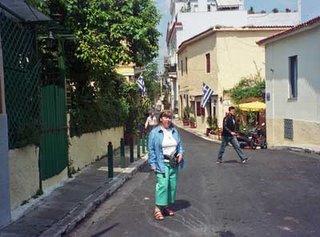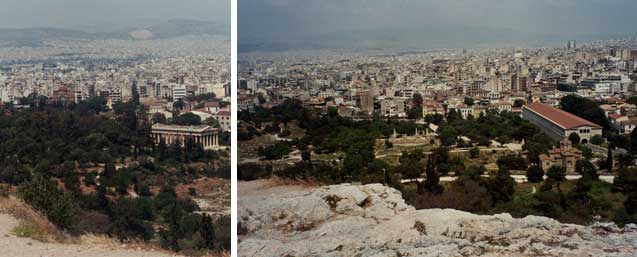Feast for the Senses: Exploring Athens

Sunday we slept in, I and my roommate Raquel, and then set out from the Central Hotel to see what the city might show us. The market squares were filled with people breaking their Easter fast on roast lamb spitted over open coals in the same manner one reads about in Homer. There was music and dancing and many folk about. At length we came to the Stoa of Attalos again, by now an old friend, but the gates to the ancient Agora just past it were again closed, so we kept wandering past ruins sunk below street level, great open expanses of blocks and marble overgrown by tall grass and flowers and bushes, submerged islands of the past lying tantalizingly just on the far side of fences and locked gates. Over the Agora in the distance the Acropolis loomed, and when at length we came far enough around it to look up at the western face of it, I had a surprise— empty scaffolding hugging the spot where the pretty little Temple of Athena Nike usually stands, perched on a high bastion just to the right of the great entrance to the Acropolis, the many-columned Propylaia.

Propylaia, entrance to Acropolis
Well, I knew what should be there, so only a little disappointed we kept edging our way around the Agora until we'd climbed the long Pnyx hill leading up to the Propylaia, past the wonderfully-preserved Temple of Hephaistos, past the little grotto where Pan, they say, used to pipe to the nymphs, past the Kallirhoe spring and right up to the olive-clad foot of the Acropolis hill, the Propylaia just above us.

Temple of Hephaistos
Turning back to face the city and the Agora, we climbed out onto a knee of the great hill that has its own famous name, the Areopagus (Mars Hill), where long before democracy set foot here the Athenian elders met to discuss the city's affairs, and where at the end of antiquity Paul preached his sermons to dubious merchants from the Agora below. I shed my shoes and we climbed up onto Athenian limestone polished by thousands of years of passage. Below the city spread out before us. Dancing swallows rode the blustery fresh wind, and we drank in the pure Greek sun and sky. Chris Downing was up there too with her granddaughter, and we shared the view and some talk, but I was too busy watching swooping swallows and thinking of Thera's flaking plaster walls.

(Click to zoom)
View from Areopagus hill: agora with temple of Hephaistos, left, Stoa of Attalos, right, our hotel in far upper right.
Descending from the heights we cut through the edge of the Agora, where a few ruins were still open to visitors, including the foundations of a temple to Hekate. There I got my first taste of what was to become a very familiar sight of which I never tired: red, red poppies overrunning the old stones, wild barley for grass rustling in the wind. Just past the temple was an orange grove fragrant with hanging jasmine, a feast for the nose.


Agora / Temple of Hecate foundations (click each to enlarge)
Past that came an unlikely feast for the ears. We were coming down to the ruins of a Roman forum, and we were drawn by the sound of pipes, flutes, drums, which in fact we had been hearing here and there all afternoon, but at length we finally discovered the source. Some Native American musicians from Taos, not far from Raquel's home, were giving an impromptu outdoor concert before the ancient Roman library of the emperor Hadrian, a grecophile who would probably have appreciated their music! Greeks danced to the unlikely music of a continent away, and old and new, far and near were blended together by Andean pan-pipes.

Native American musicians in front of Library of Hadrian.
For a late lunch we had Greek salad at an outdoor cafe— of course— and that ubiquitous iced chocolate drink that became a staple of my daily wanderings.


0 Comments:
Post a Comment
<< Home